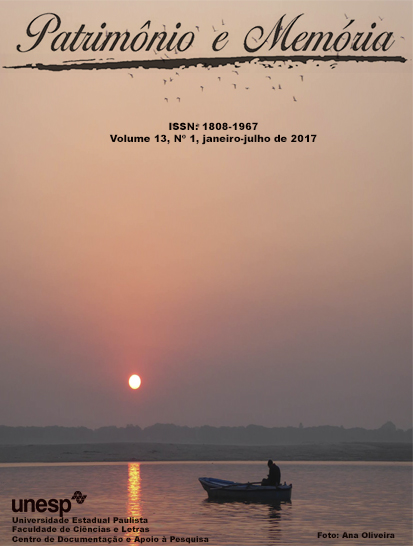Painless exile
a reading of Quando chegar a minha vez, by Giselda Laporta Nicolelis
DOI:
https://doi.org/10.5016/pem.v13i1.3418Keywords:
Exile, Military dictatorship, Giselda Laporta Nicolelis, Children’s & youth’s literature.Abstract
Wheter studying children’s & youth’s novel Quando chegar a minha vez (When my turn comes roud), by Giselda Laporta Nicolelis (1984), this article problematizes the way that the work demonstrates literally a return to the country of political exiles. For analysis we can have a dialogue with Flavio Aguiar’s (w.d.) critical conception about the big scenarios that have been built by Brazilian Literatura and Culture, as well as the complex questions around exile formulated by Maren & Marcelo Vinãr (1992) and by Edward Said (2003). From this discussion, and from contributians by historian Daniel Aarão Reis Filho (2004) about political, ideological and cultural climate prevailed in Brazil from the end of 70’s and beginning of 80’s, it shows like is exile outlined, in this novel, as an ordinary experience, and not an extraordinary one, concealing, by this way, suffering and horror usually presents at this kind of historical event.
References
AGUIAR, Flávio. Sambas-enredo: Do Império aos nossos dias, do romance de Alencar à memorialística da repressão, a literatura brasileira nos legou alguns dramas da terra – os sambas-enredo. Retrato do Brasil, São Paulo, Editora Política, n. 26, s.d., p. 309-311.
COELHO, Nelly Novaes. Literatura infantil: teoria, análise, didática. 7. ed. rev. atual. São Paulo: Moderna, 2011.
GIL, Gilberto. Não chores mais. In: ______. Realce [L.P.]. Rio de Janeiro: WEA/Electra, 1979.
GUARANY, Reinaldo. A fuga. São Paulo: Brasiliense, 1984.
GUEDES, Beto. Sol de Primavera. In: ______. Sol de primavera [L.P.]. Rio de Janeiro: EMI, 1979.
HOUAISS, Antonio. Houaiss Eletrônico. Versão monousuário 3.0. Rio de Janeiro: Objetiva, 2009.
NASSIF, Luís. Gilberto Gil: Por trás da música “Não chore mais”. Disponível em: <http://www.geledes.org.br/gilberto-gil-por-tras-da-musica-nao-chore-mais/#gs.V=itHHI>. Acesso em: 19 maio 2017.
NICOLELIS, Giselda Laporta. Quando chegar a sua vez. São Paulo: Ibrasa, 1984.
REIS FILHO, Daniel. Um passado imprevisível: a construção da memória da esquerda nos anos 60. In: ______ et al. Versões e ficções: o sequestro da história. 2. ed. ampl. São Paulo: Editora Fundação Perseu Abramo, 1997, p. 31-45.
______. Ditadura e sociedade: as reconstruções da memória. In: ______; RIDENTI, Marcelo; SÁ MOTTA, Rodrigo Patto [orgs.]. O golpe e a ditadura militar: 40 anos depois (1964 - 2004). Bauru: EDUSC, 2004, p. 29-52.
SAID, Edward W. Reflexões sobre o exílio. In: ______. Reflexões sobre o exílio e outros ensaios. Trad. Pedro Maia Soares. São Paulo: Companhia das Letras, 2003.
VIÑAR, Maren; VIÑAR, Marcelo. Exílio e tortura. Trad. Wladimir Barreto Lisboa. São Paulo: Escuta, 1992.
Downloads
Published
How to Cite
Issue
Section
License
Copyright (c) 2017 Patrimônio e Memória

This work is licensed under a Creative Commons Attribution 4.0 International License.
All the content of the journal, except where noted, is licensed under a Creative Commons BY attribution license.


